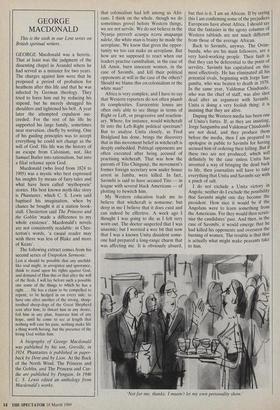GEORGE MACDONALD This is the sixth in our Lent series
on British spiritual writers.
GEORGE Macdonald was a heretic. That at least was the judgment of the dissenting chapel in Arundel where he had served as a minister for two years. The charges against him were that he proposed a period of probation for heathens after this life and that he was infected by German theology. They tried to force him out by reducing his stipend, but he merely shrugged his shoulders and tightened his belt. A year later the attempted expulsion suc- ceeded. For the rest of his life he supported his large family, sometimes near starvation, chiefly by writing. One of his guiding principles was to accept everything he could not change as the will of God. His life was the history of an escape from Calvinism, not, like Samuel Butler into rationalism, but into a filial reliance upon God.
Macdonald (who lived from 1824 to 1905) was a mystic who best expressed his insights by means of fairy-tales and what have been called 'mythopoeic' stories. His best known myth-like story is Phantastes, which C. S. Lewis 'said baptised his imagination, when by chance he bought it at a station book- stall. Chesterton said The Princess and the Goblin 'made a difference to my whole existence'. Macdonald's novels are not consistently readable: in Ches- terton's words, 'a casual reader may wish there was less of Blake and more of Keats'.
The following extract comes from his second series of Unspoken Sermons: Lest it should he possible that any unchild- like soul might, in arrogance and ignorance, think to stand upon his rights against God, and demand of Him this or that after the will of the flesh, I will lay before such a possible one some of the things to which he has a right.... He has a claim to be compelled to repent; to be hedged in on every side: to have one after another of the strong, sharp- toothed sheep-dogs of the Great Shepherd sent after him, to thwart him in any desire, foil him in any plan, frustrate him of any hope, until he come to see at length that nothing will ease his pain, nothing make life a thing worth having, but the presence of the living God within him.
A biography of George Macdonald was pitblished by his son, Greville, in 1924. Phantastes is published in paper- back by Dent and by. Lion. At the Back of the North Wind, The Princess and the Goblin, and The Princess and Cur- die are published by Penguin. In 1946 C. S. Lewis edited an anthology from Macdonald's works.


























































 Previous page
Previous page